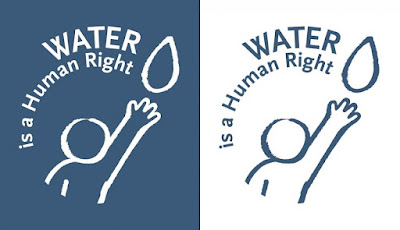EcoWaste Coalition to Water Regulators and Water Companies: “Water is a consumer and human right”
https://www.right2water.eu/
As millions of Manila Water customers continue to suffer
from water scarcity, a waste and pollution watch group appealed to water
resource regulators as well as to water companies to ensure public access to
sufficient, safe, acceptable, physically accessible, and affordable water
supply.
In a press statement coinciding with today’s observance
of World Consumer Rights Day (WCRD), the EcoWaste Coalition emphasized the role
of public authorities and private corporations as duty bearers in guaranteeing
people’s access to water
“As duty bearers, we urge water agencies and companies to
do everything that is necessary to alleviate the sufferings of those affected
by the water shortage. We join our
citizens, as right holders, in reminding those responsible for realizing our
human right to water to find a long-lasting solution to our water woes,” said
Thony Dizon, Chemical Safety Campaigner, EcoWaste Coalition.
In reference to the P18.7 billion Kaliwa Dam project in
the Sierra Madre to be funded by China, the EcoWaste Coalition reiterated that
any solution to the water scarcity being faced by water consumers in the East
Zone of Metro Manila should not disrespect the rights of other right holders,
particularly the indigenous peoples (IPs).
“We are one with the Save Sierra Madre Network Alliance
and the IP communities in seeking the genuine restoration of watersheds and
forests and in opposing all destructive development projects, especially the
construction of new mega-dams, within the Sierra Madre,” Dizon added.
Atty. Jacqueline Ann de Guia, Spokesperson of the
Commission on Human Rights, yesterday said that: “In finding a resolution to this problem, we
hope that ways forward would always be mindful of the rights of others, such as
those of IP communities in developing dams, and would always to the benefit of
the majority of Filipinos.”
In asserting the people’s right to water, the EcoWaste
Coalition cited Resolution 64/292 adopted by the United Nations General
Assembly in 2010 explicitly recognizing the human right to water and sanitation
and acknowledging that clean drinking water and sanitation are essential to the
realization of all human rights.
The group also cited the 17 Sustainable Development Goals
(SDGs) of the 2030 Agenda for Sustainable Development adopted at the 2015 UN
Summit, which includes Goal No. 6 that seeks to “ensure availability and
sustainable management of water and sanitation for all.”
Water, which is a basic entitlement of all people, should
be, according to the United Nations:
“Sufficient:
The water supply for each person must be sufficient and continuous for personal
and domestic uses. These uses ordinarily include drinking, personal sanitation,
washing of clothes, food preparation, personal and household hygiene.”
“Safe: The
water required for each personal or domestic use must be safe, therefore free
from micro-organisms, chemical substances and radiological hazards that constitute
a threat to a person's health.”
“Acceptable:
Water should be of an acceptable color, odor and taste for each personal or
domestic use, and all water facilities and services must be culturally
appropriate and sensitive to gender, lifecycle and privacy requirements.”
“Physically accessible: Everyone has the right to a water
and sanitation service that is physically accessible within, or in the
immediate vicinity of the household, educational institution, workplace or
health institution.”
“Affordable: Water,
and water facilities and services, must be affordable for all.”
-end-
Reference:
http://chr.gov.ph/statement-of-chr-spokesperson-atty-jacqueline-ann-de-guia-on-the-claimed-water-crisis/
http://www.un.org/waterforlifedecade/human_right_to_water.shtml
https://www.un.org/en/development/desa/population/migration/generalassembly/docs/globalcompact/A_RES_70_1_E.pdf
https://savesierramadre.page.tl/SSMNA-h-s-Position-Paper-on-the-Construction-of-Mega_Dams-in-Sierra-Madre.htm






Comments